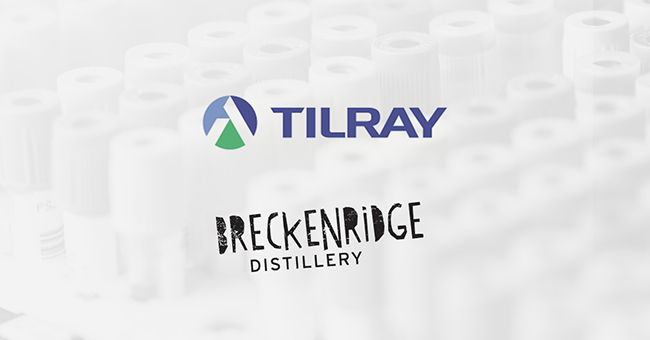Canadian cannabis producer Tilray continued to expand its beverage interests with the acquisition of Colorado-based Breckenridge Distillery last week.
The Canadian company already has ties to the beverage industry, having partnered with Anheuser-Busch InBev in 2018 on a venture to develop cannabis-infused (THC and CBD) non-alcoholic drinks, while also acquiring SweetWater Brewing Company, which produces a line of infused non-alc beers, through a merger with Aphria, Inc. in May that made it the world’s largest global cannabis company.
Together, SweetWater and Breckenridge represent “the cornerstones of [Tilray’s] beverage alcohol segment” that “further diversifies the company’s net revenue mix,” according to a press release. The acquisition is expected to be immediately margin accretive with the distillery generating adjusted EBITDA margins of around 25%.
“Tilray’s strength lies in our ability to identify and significantly expand leading CPG lifestyle brands that resonate powerfully with consumers,” said Irwin D. Simon, Chairman and CEO of Tilray, in a press release. “Breckenridge Distillery is an iconic addition to our platform in this respect based on its portfolio of award-winning spirits, passionate consumer engagement, and a strong sales and distribution network. We see tremendous potential for Breckenridge and our existing SweetWater brand to complement each other, expanding their respective reach and driving further profitable growth in our beverage alcohol segment.”
For Breckenridge, aligning with Tilray is expected to help expand the audience for its products, of which 85% are sold in Colorado. The company plans to “leverage SweetWater’s existing nationwide infrastructure to accelerate Breckenridge Distillery and create new, greatly-expanded consumer awareness and product adoption.”
“We are excited to join Tilray and drive revenue growth as part of its global and leading CPG and cannabis-lifestyle platform,” said Bryan Nolt, Breckenridge Distillery’s Founder and Chief Executive Officer, in the release. “The award-winning spirits that have driven our success will unquestionably benefit from access to Tilray’s global distribution network and opportunities to expand into cannabis and edible-related products in the U.S.”
Tilray’s acquisition of Breckenridge adds a further piece to the company’s foundation as it continues its long-term planning to enter the U.S. cannabis market, with Simon noting the company’s “strategy of leveraging our growing portfolio of U.S. CPG brands to launch THC-based product adjacencies,” pending federal legalization of marijuana. Having planted its flag in beer with SweetWater, adding an established spirits brand to the portfolio opens the door for potential opportunities for innovation and advancement in the cannabis spirits space, in turn complementing Tilray’s complete U.S. CPG portfolio, which also includes Manitoba Harvest.
Tilray’s beverage alcohol revenue hit $15.5 million, about 9% of total revenue, in Q3 2021. The company has set the goal of generating $4 billion revenue by 2024, contingent upon federal restrictions on THC being lifted.
Yet like other Canadian players like Canopy Growth and Aurora, Tilray remains unprofitable even as its sales continue to grow rapidly, placing a heavier onus on winning federal legalization of marijuana in the U.S. That strategy comes with significant risk, as the company continues to do business — most recently acquiring the remaining debt of struggling cannabis retailer Med Men in a deal valued at $168 million, convertible and exercisable for approximately 21% of voting shares upon legalization — in order to take advantage of the U.S. market, but with no guarantee as to when, or if, that will happen.
Writing in New Cannabis Ventures in October, Alan Brochstein, CFA, noted that Tilray is “taking risk by expending cash or issuing shares for assets that could prove to be worthless to them if laws or regulations don’t change.”
Without the cushion of underlying profitability, Brochstein noted that Tilray “could be in a position where they need to raise additional equity capital if they continue to aggressively spend capital in the U.S.”
